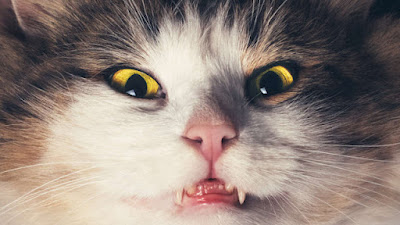Many of us may be unknowingly living with a psychopath, according to the authors of a new study in the Journal of Research in Personality. Cute and cuddly at first glance, these charming housemates of ours have a nefarious side that can now be measured thanks to a newly developed psychopathy test for cats.
 |
| Test to check if Your Cat A Psychopath? |
Available online for any cat owner to complete, the survey measures 46 feline behaviors that can be used to identify a psychopath pet. To create the test, the researchers began by asking 549 people about their cats’ levels of boldness, meanness and inhibition – the three traits that make up the triarchic model of psychopathy in humans.
Based on these answers, the authors identified 40 behavioral themes, which they used to create a preliminary 58-item cat psychopathy questionnaire. They then administered this to a further 1,463 cat owners and analyzed the responses in order to refine the survey.
Known as the CAT-Tri+ test, the final version of the questionnaire inquires about 12 different behaviors that contribute to a cat’s level of boldness, such as whether they torment mice and other prey animals before killing them. The next 12 items measure disinhibition, which includes behaviors such as sitting on laptops, books, and other objects that owners are trying to use.
Next, the questionnaire seeks to assess meanness by asking about tendencies like an apparent lack of guilt after misbehaving. In addition to these triarchic traits, the CAT-Tri+ model of psychopathy includes the two additional attributes of pet-unfriendliness and human-unfriendliness.
The first of these consists of behaviors such as displacing other pets from “favorable positions” like beds and sofas, while the latter involves things like purring while attacking people.
After administering the test and then quizzing owners about their relationships with their pets, the authors concluded that “disinhibition and pet-unfriendliness predicted a higher quality cat-owner relationship; meanness and boldness predicted a lower quality relationship.”
According to the researchers, the information provided by this questionnaire can help owners better understand their pets and take action to improve their wellbeing. “For example, a cat that has a high score on the 'boldness' scale may benefit from large cat trees and tall scratching posts, as the CAT-Tri+ items suggest that a bold cat enjoys exploring and climbing,” they write.
Additionally, they suggest that their test could help animal shelters rehome cats by identifying suitable owners. For instance, “a cat that has a high score on the 'pet-unfriendly' scale may benefit from being rehomed in a household where there are no other pets.”
While the idea of living with a psychopathic carnivore may seem unsettling, the authors insist that many of the traits involved are present in a wide variety of animals. In times gone by, such behaviors probably helped cats’ evolutionary ancestors to hunt, mate, and defend their territory, and were therefore essential to the survival of the species. Nowadays, though, it just leads to a lot of items getting pushed off tables.
